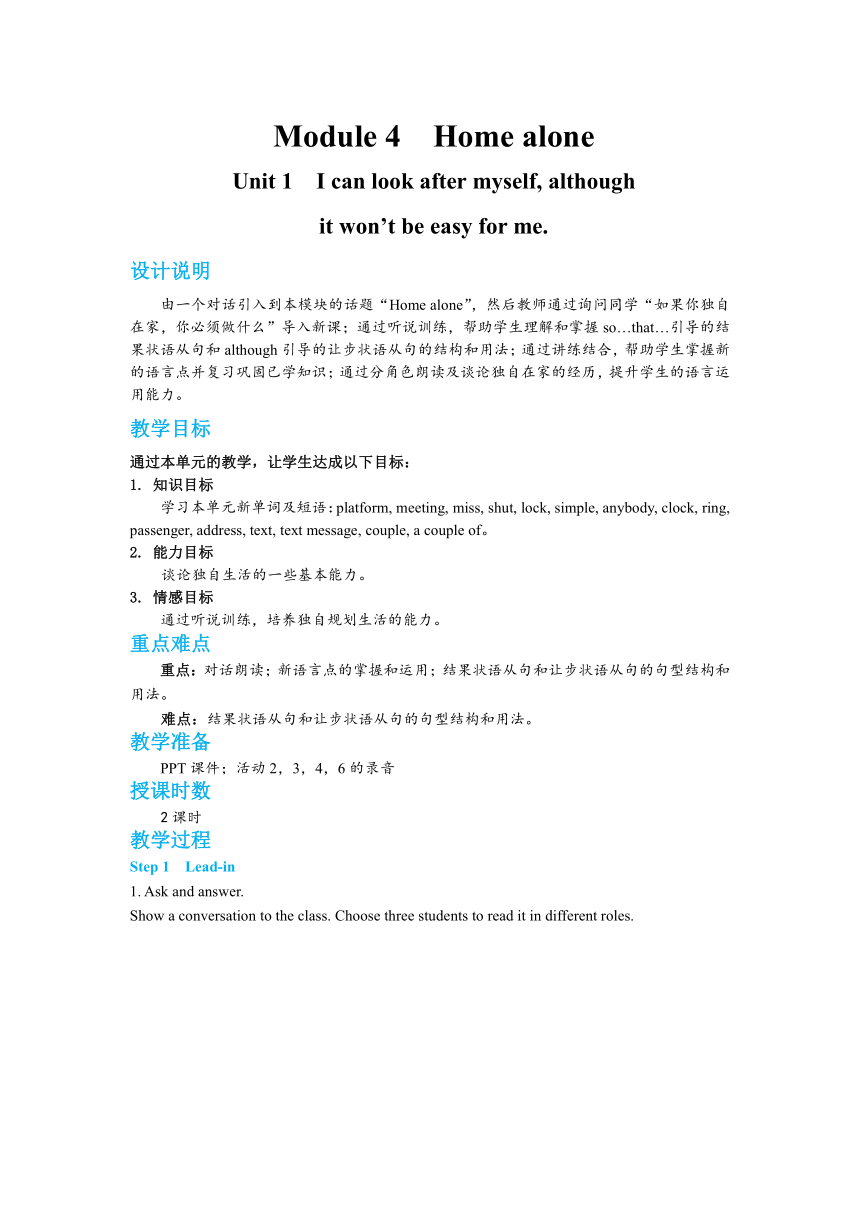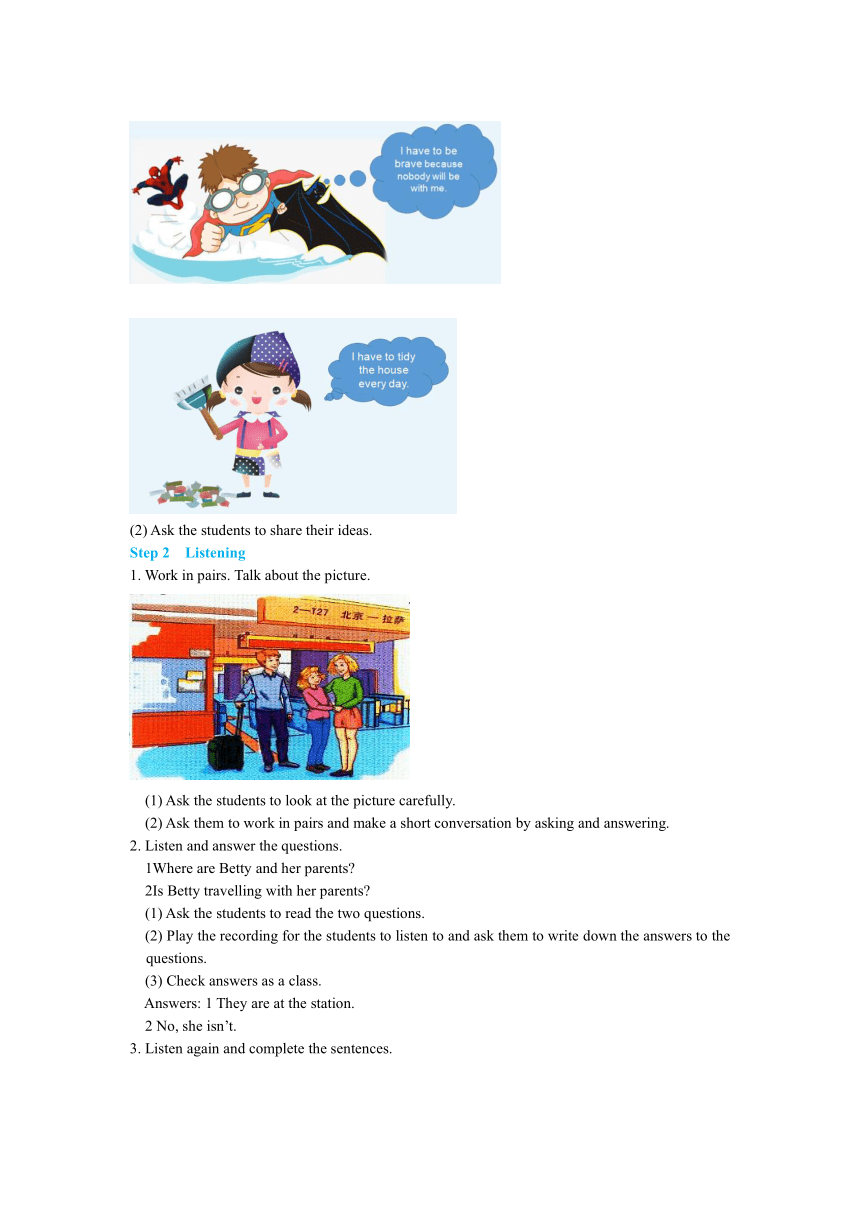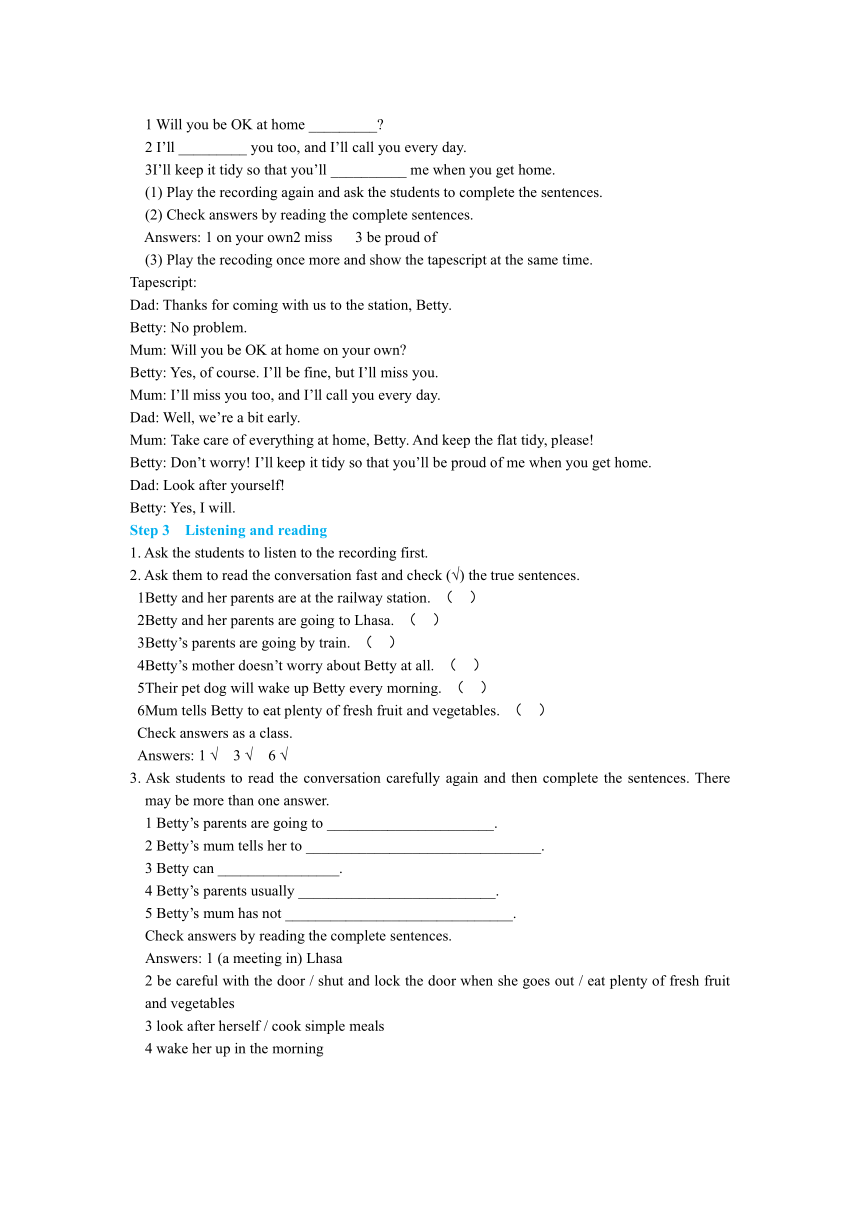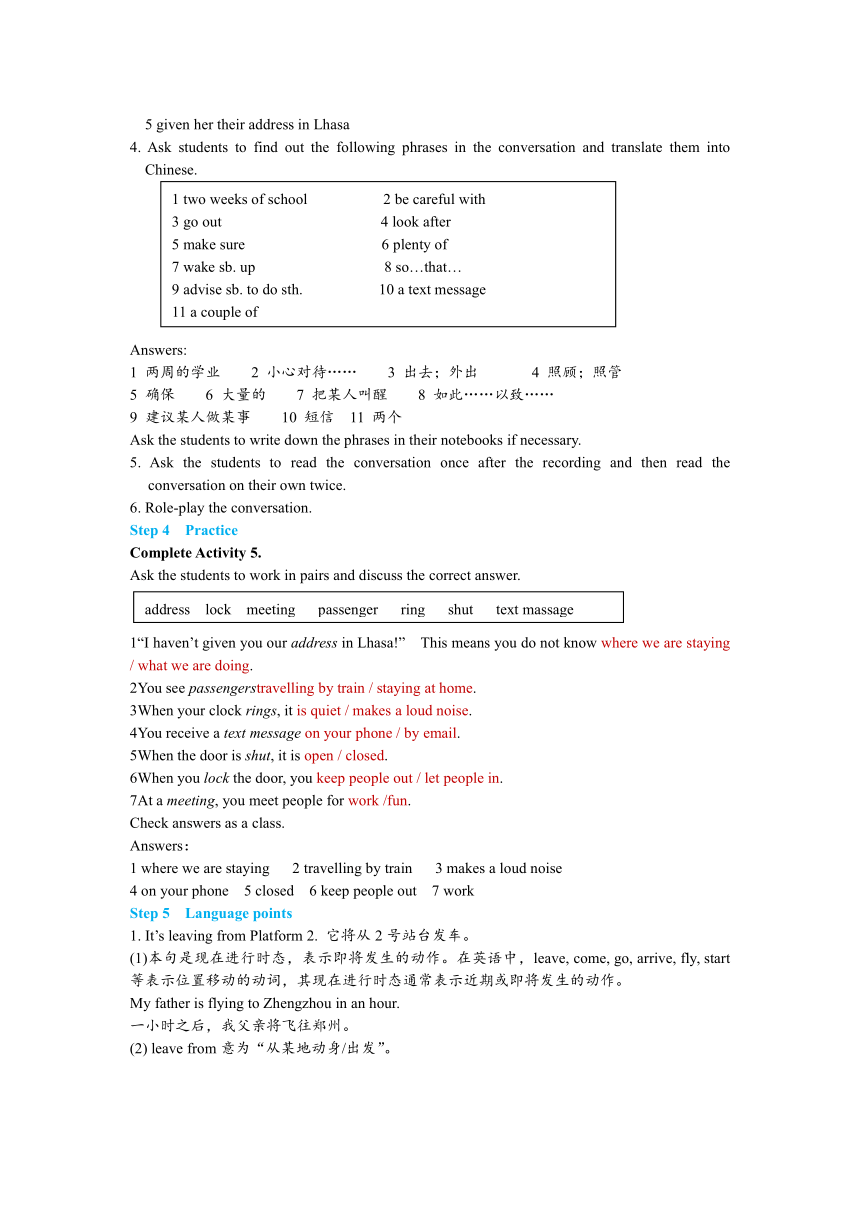Module 4 Home alone Unit 1 I can look after myself, although it won’t be easy for me. 教案
文档属性
| 名称 | Module 4 Home alone Unit 1 I can look after myself, although it won’t be easy for me. 教案 |

|
|
| 格式 | docx | ||
| 文件大小 | 923.6KB | ||
| 资源类型 | 教案 | ||
| 版本资源 | 外研版 | ||
| 科目 | 英语 | ||
| 更新时间 | 2020-08-15 00:00:00 | ||
图片预览





文档简介
Module 4 Home alone
Unit 1 I can look after myself, although
it won’t be easy for me.
设计说明
由一个对话引入到本模块的话题“Home alone”,然后教师通过询问同学“如果你独自在家,你必须做什么”导入新课;通过听说训练,帮助学生理解和掌握so…that…引导的结果状语从句和although引导的让步状语从句的结构和用法;通过讲练结合,帮助学生掌握新的语言点并复习巩固已学知识;通过分角色朗读及谈论独自在家的经历,提升学生的语言运用能力。
教学目标
通过本单元的教学,让学生达成以下目标:
1. 知识目标
学习本单元新单词及短语:platform, meeting, miss, shut, lock, simple, anybody, clock, ring, passenger, address, text, text message, couple, a couple of。
2. 能力目标
谈论独自生活的一些基本能力。
3. 情感目标
通过听说训练,培养独自规划生活的能力。
重点难点
重点:对话朗读;新语言点的掌握和运用;结果状语从句和让步状语从句的句型结构和用法。
难点:结果状语从句和让步状语从句的句型结构和用法。
教学准备
PPT课件;活动2,3,4,6的录音
授课时数
2课时
教学过程
Step 1 Lead-in
1. Ask and answer.
Show a conversation to the class. Choose three students to read it in different roles.
2. Discuss.
If you are at home alone, what do you have to do?
(1) Share some ideas with the class.
(2) Ask the students to share their ideas.
Step 2 Listening
1. Work in pairs. Talk about the picture.
(1) Ask the students to look at the picture carefully.
(2) Ask them to work in pairs and make a short conversation by asking and answering.
2. Listen and answer the questions.
1Where are Betty and her parents?
2Is Betty travelling with her parents?
(1) Ask the students to read the two questions.
(2) Play the recording for the students to listen to and ask them to write down the answers to the questions.
(3) Check answers as a class.
Answers: 1 They are at the station.
2 No, she isn’t.
3. Listen again and complete the sentences.
1 Will you be OK at home _________?
2 I’ll _________ you too, and I’ll call you every day.
3I’ll keep it tidy so that you’ll __________ me when you get home.
(1) Play the recording again and ask the students to complete the sentences.
(2) Check answers by reading the complete sentences.
Answers: 1 on your own2 miss 3 be proud of
(3) Play the recoding once more and show the tapescript at the same time.
Tapescript:
Dad: Thanks for coming with us to the station, Betty.
Betty: No problem.
Mum: Will you be OK at home on your own?
Betty: Yes, of course. I’ll be fine, but I’ll miss you.
Mum: I’ll miss you too, and I’ll call you every day.
Dad: Well, we’re a bit early.
Mum: Take care of everything at home, Betty. And keep the flat tidy, please!
Betty: Don’t worry! I’ll keep it tidy so that you’ll be proud of me when you get home.
Dad: Look after yourself!
Betty: Yes, I will.
Step 3 Listening and reading
1. Ask the students to listen to the recording first.
2. Ask them to read the conversation fast and check (√) the true sentences.
1Betty and her parents are at the railway station. ( )
2Betty and her parents are going to Lhasa. ( )
3Betty’s parents are going by train. ( )
4Betty’s mother doesn’t worry about Betty at all. ( )
5Their pet dog will wake up Betty every morning. ( )
6Mum tells Betty to eat plenty of fresh fruit and vegetables. ( )
Check answers as a class.
Answers: 1 √ 3 √ 6 √
3. Ask students to read the conversation carefully again and then complete the sentences. There may be more than one answer.
1 Betty’s parents are going to ______________________.
2 Betty’s mum tells her to _______________________________.
3 Betty can ________________.
4 Betty’s parents usually __________________________.
5 Betty’s mum has not ______________________________.
Check answers by reading the complete sentences.
Answers: 1 (a meeting in) Lhasa
2 be careful with the door / shut and lock the door when she goes out / eat plenty of fresh fruit and vegetables
3 look after herself / cook simple meals
4 wake her up in the morning
5 given her their address in Lhasa
4. Ask students to find out the following phrases in the conversation and translate them into Chinese.
1 two weeks of school 2 be careful with
3 go out 4 look after
5 make sure 6 plenty of
7 wake sb. up 8 so…that…
9 advise sb. to do sth. 10 a text message
11 a couple of
Answers:
1 两周的学业 2 小心对待…… 3 出去;外出 4 照顾;照管
5 确保 6 大量的 7 把某人叫醒 8 如此……以致……
9 建议某人做某事 10 短信 11 两个
Ask the students to write down the phrases in their notebooks if necessary.
5. Ask the students to read the conversation once after the recording and then read the conversation on their own twice.
6. Role-play the conversation.
Step 4 Practice
Complete Activity 5.
Ask the students to work in pairs and discuss the correct answer.
address lock meeting passenger ring shut text massage
1“I haven’t given you our address in Lhasa!” This means you do not know where we are staying / what we are doing.
2You see passengerstravelling by train / staying at home.
3When your clock rings, it is quiet / makes a loud noise.
4You receive a text message on your phone / by email.
5When the door is shut, it is open / closed.
6When you lock the door, you keep people out / let people in.
7At a meeting, you meet people for work /fun.
Check answers as a class.
Answers:
1 where we are staying 2 travelling by train 3 makes a loud noise
4 on your phone 5 closed 6 keep people out 7 work
Step 5 Language points
1. It’s leaving from Platform 2. 它将从2号站台发车。
(1)本句是现在进行时态,表示即将发生的动作。在英语中,leave, come, go, arrive, fly, start等表示位置移动的动词,其现在进行时态通常表示近期或即将发生的动作。
My father is flying to Zhengzhou in an hour.
一小时之后,我父亲将飞往郑州。
(2) leave from意为“从某地动身/出发”。
[拓展]
leave for意为“动身去某地”
2. So am I, but I can’t miss two weeks of school.
我也是(很遗憾),但是我不能两周不上课。
“So+连系动词be/助动词/情态动词+主语”是倒装结构,表示前面所述的某一肯定的情况也同样适用于本句主语。
Tim is good at Chinese, and so is his sister.
蒂姆擅长汉语,他妹妹也擅长。
My father enjoys taking photos. So do I.
我父亲喜欢摄影,我也喜欢。
Lingling has been to Hangzhou. So has Daming.
玲玲去过杭州,大明也去过。
[拓展]
“Neither / Nor+连系动词be/助动词/情态动词+主语”则表示前面所述的某一否定的情况也同样适用于本句主语。
My father can’t speak French. Neither can my mother.
我父亲不会讲法语,我母亲也不会。
[注意]
(1)上面两个句型中的be动词、助动词或情态动词在时态上必须与前面的句子保持一致,在数上必须与后面的主语保持一致。
(2)“So+主语+连系动词be/助动词/情态动词”是另一个句型,它表示赞同对方所说的话,前后两个句子主语是一致的。
—It’s very hot today. 今天很炎热。
—So it is. 的确是。
3. There won’t be anybody to wake you up in the morning.
早晨没有人叫你起床了。
(1)anybody不定代词,相当于anyone,意为“某人;任何人”,常用于否定句、疑问句或条件句中。
Does anybody else want to go swimming?
还有人想去游泳吗?
She didn’t want anybody to know it.
她不想让任何人知道这件事情。
(2) wake sb. up意为“叫醒某人”,up为副词,如果名词作宾语,可以放在up之前或之后,如果代词作宾语,必须放在up之前。
My mother wakes me up every morning.
每天早上我母亲叫醒我。
[拓展]
wake up也可以单独使用,意为“醒来”。
What time do you usually wake up in the morning?
在早上你通常几点钟醒来?
4. We advise all passengers for Train T27 to Lhasa to go immediately to Platform2. 我们建议所有乘坐T27 次列车去往拉萨的旅客立即去2号站台。
advise sb. (not) to do sth. 意为“建议某人(不要)做某事”,动词不定式作宾补。
The police advised people to stay at home.
警方建议民众要待在家里。
He advised us not to swim in the lake alone.
他建议我们不要单独在湖里游泳。
[助记]
advise (动词)——advice (名词)
5. See you in a couple of weeks! 两周之后见!
a couple of意为“两个;几个”,修饰可数名词复数形式,通常指人或同类事物中的两个或几个。
We saw a couple of children standing over there.
我们看到两个孩子正站在那边。
She went to Shenzhen a couple of years ago.
几年之前她去了深圳。
[注意]
a pair of意为“一双/副……”,修饰可数名词复数形式,通常指成对的或成对使用的东西。
My mother bought me a pair of shoes yesterday.
昨天我母亲给我买了一双鞋。
Step 6 Pronunciation and speaking
1. Listen and mark the words which the speaker links.
(1) Tell the students when a word starts with a vowel sound, it is often linked to the word that comes before it, so that they sound like one word.
(2) Ask the students to read the sentences and guess where the speakers will link words.
(3) Then tell them that if a word starts with the same sound as the last sound in the word in front of it, they are also linked.
(4) Tell the students to see if there are any examples in the sentences, and link them if so.
(5)Play the recording for the students to listen to and check the words they have linked.
Possible answers:
1Be especially careful with the door. Shut it when you’re in and lock it when you go out.
2I can look after myself, although it won’t be easy for me.
3I’m sure I’ve forgotten something, but I don’t know what it is!
Now listen again and repeat.
2. Work in pairs. Imagine you are staying at home by yourself. Ask and answer.
1Can you look after yourself?
2How will you make sure you wake up in the morning?
3What will you eat?
Step 7 Homework
1. Read the conversation.
2. Talk with your partner about things you can do if you are at home alone.
当堂达标
Ⅰ. 单项填空。
1. —I don’t like being late for school.
—_________.
A. So am I B. Neither do I
C. So I am D. So I do
2. These shoes are _________ cool that they are popular among the young.
A. so B. very C. too D. such
3. —You _________ for Beijing this Saturday, right? I’d like to see you off.
—Oh, how kind you are!
A. left B. was leaving
C. are leaving D. have left
4. There _________ a _________ glasses on the desk.
A. is; couple B. are; couple of
C. are; pair D. is; pair of
Ⅱ. 根据句意及首字母或汉语提示完成单词。
1. Don’t forget to s_________ all the windows when it’s windy.
2. More than 2,000 people will attend the _________(会议).
3. Her c_________ didn’t work this morning. That’s why she got up late and was late for school.
4. A couple of __________(旅客)missed their trains because of the bad weather.
5. My grandparents enjoyed the _________(简单的)life in the countryside.
6. The train to Shanghai is waiting at P________ 5. Come this way.
Ⅲ. 根据汉语意思完成句子(每空一词)。
1. 为了不吵醒孩子,妈妈悄悄地起床。
In order not to ________ the baby ________, the mother got up quietly.
2. 小心对待你的学习用品。
________ _________ ________ your school things.
3. 你离开房间时确保锁上门。
________ ________ you lock the door when you leave the room.
4. 快一点儿!轮船就要起航了。
Hurry up! The ship is about ________ ________.
5. 托尼昨天建议我每天早晨读20分钟英语。
Tony ________ me ________ ________ English for 20 minutes every morning.
答案:Ⅰ. 1. B 2. A 3. C 4. D
Ⅱ. 1. shut 2. meeting 3. clock 4. passengers 5. simple 6. Platform
Ⅲ. 1. wake; up 2. Be careful with 3. Make sure 4. to leave 5. advised; to read
板书设计
Module 4 Home alone
Unit 1 I can look after myself, although it won’t be easy for me.
although引导让步状语从句
so… that…引导结果状语从句
1. 现在进行时表将来:go, come, leave, fly, start, arrive…
2. so+连系动词be/助动词/情态动词+主语
neither +连系动词be/助动词/情态动词+主语
3. wake sb. up
wake up
Unit 1 I can look after myself, although
it won’t be easy for me.
设计说明
由一个对话引入到本模块的话题“Home alone”,然后教师通过询问同学“如果你独自在家,你必须做什么”导入新课;通过听说训练,帮助学生理解和掌握so…that…引导的结果状语从句和although引导的让步状语从句的结构和用法;通过讲练结合,帮助学生掌握新的语言点并复习巩固已学知识;通过分角色朗读及谈论独自在家的经历,提升学生的语言运用能力。
教学目标
通过本单元的教学,让学生达成以下目标:
1. 知识目标
学习本单元新单词及短语:platform, meeting, miss, shut, lock, simple, anybody, clock, ring, passenger, address, text, text message, couple, a couple of。
2. 能力目标
谈论独自生活的一些基本能力。
3. 情感目标
通过听说训练,培养独自规划生活的能力。
重点难点
重点:对话朗读;新语言点的掌握和运用;结果状语从句和让步状语从句的句型结构和用法。
难点:结果状语从句和让步状语从句的句型结构和用法。
教学准备
PPT课件;活动2,3,4,6的录音
授课时数
2课时
教学过程
Step 1 Lead-in
1. Ask and answer.
Show a conversation to the class. Choose three students to read it in different roles.
2. Discuss.
If you are at home alone, what do you have to do?
(1) Share some ideas with the class.
(2) Ask the students to share their ideas.
Step 2 Listening
1. Work in pairs. Talk about the picture.
(1) Ask the students to look at the picture carefully.
(2) Ask them to work in pairs and make a short conversation by asking and answering.
2. Listen and answer the questions.
1Where are Betty and her parents?
2Is Betty travelling with her parents?
(1) Ask the students to read the two questions.
(2) Play the recording for the students to listen to and ask them to write down the answers to the questions.
(3) Check answers as a class.
Answers: 1 They are at the station.
2 No, she isn’t.
3. Listen again and complete the sentences.
1 Will you be OK at home _________?
2 I’ll _________ you too, and I’ll call you every day.
3I’ll keep it tidy so that you’ll __________ me when you get home.
(1) Play the recording again and ask the students to complete the sentences.
(2) Check answers by reading the complete sentences.
Answers: 1 on your own2 miss 3 be proud of
(3) Play the recoding once more and show the tapescript at the same time.
Tapescript:
Dad: Thanks for coming with us to the station, Betty.
Betty: No problem.
Mum: Will you be OK at home on your own?
Betty: Yes, of course. I’ll be fine, but I’ll miss you.
Mum: I’ll miss you too, and I’ll call you every day.
Dad: Well, we’re a bit early.
Mum: Take care of everything at home, Betty. And keep the flat tidy, please!
Betty: Don’t worry! I’ll keep it tidy so that you’ll be proud of me when you get home.
Dad: Look after yourself!
Betty: Yes, I will.
Step 3 Listening and reading
1. Ask the students to listen to the recording first.
2. Ask them to read the conversation fast and check (√) the true sentences.
1Betty and her parents are at the railway station. ( )
2Betty and her parents are going to Lhasa. ( )
3Betty’s parents are going by train. ( )
4Betty’s mother doesn’t worry about Betty at all. ( )
5Their pet dog will wake up Betty every morning. ( )
6Mum tells Betty to eat plenty of fresh fruit and vegetables. ( )
Check answers as a class.
Answers: 1 √ 3 √ 6 √
3. Ask students to read the conversation carefully again and then complete the sentences. There may be more than one answer.
1 Betty’s parents are going to ______________________.
2 Betty’s mum tells her to _______________________________.
3 Betty can ________________.
4 Betty’s parents usually __________________________.
5 Betty’s mum has not ______________________________.
Check answers by reading the complete sentences.
Answers: 1 (a meeting in) Lhasa
2 be careful with the door / shut and lock the door when she goes out / eat plenty of fresh fruit and vegetables
3 look after herself / cook simple meals
4 wake her up in the morning
5 given her their address in Lhasa
4. Ask students to find out the following phrases in the conversation and translate them into Chinese.
1 two weeks of school 2 be careful with
3 go out 4 look after
5 make sure 6 plenty of
7 wake sb. up 8 so…that…
9 advise sb. to do sth. 10 a text message
11 a couple of
Answers:
1 两周的学业 2 小心对待…… 3 出去;外出 4 照顾;照管
5 确保 6 大量的 7 把某人叫醒 8 如此……以致……
9 建议某人做某事 10 短信 11 两个
Ask the students to write down the phrases in their notebooks if necessary.
5. Ask the students to read the conversation once after the recording and then read the conversation on their own twice.
6. Role-play the conversation.
Step 4 Practice
Complete Activity 5.
Ask the students to work in pairs and discuss the correct answer.
address lock meeting passenger ring shut text massage
1“I haven’t given you our address in Lhasa!” This means you do not know where we are staying / what we are doing.
2You see passengerstravelling by train / staying at home.
3When your clock rings, it is quiet / makes a loud noise.
4You receive a text message on your phone / by email.
5When the door is shut, it is open / closed.
6When you lock the door, you keep people out / let people in.
7At a meeting, you meet people for work /fun.
Check answers as a class.
Answers:
1 where we are staying 2 travelling by train 3 makes a loud noise
4 on your phone 5 closed 6 keep people out 7 work
Step 5 Language points
1. It’s leaving from Platform 2. 它将从2号站台发车。
(1)本句是现在进行时态,表示即将发生的动作。在英语中,leave, come, go, arrive, fly, start等表示位置移动的动词,其现在进行时态通常表示近期或即将发生的动作。
My father is flying to Zhengzhou in an hour.
一小时之后,我父亲将飞往郑州。
(2) leave from意为“从某地动身/出发”。
[拓展]
leave for意为“动身去某地”
2. So am I, but I can’t miss two weeks of school.
我也是(很遗憾),但是我不能两周不上课。
“So+连系动词be/助动词/情态动词+主语”是倒装结构,表示前面所述的某一肯定的情况也同样适用于本句主语。
Tim is good at Chinese, and so is his sister.
蒂姆擅长汉语,他妹妹也擅长。
My father enjoys taking photos. So do I.
我父亲喜欢摄影,我也喜欢。
Lingling has been to Hangzhou. So has Daming.
玲玲去过杭州,大明也去过。
[拓展]
“Neither / Nor+连系动词be/助动词/情态动词+主语”则表示前面所述的某一否定的情况也同样适用于本句主语。
My father can’t speak French. Neither can my mother.
我父亲不会讲法语,我母亲也不会。
[注意]
(1)上面两个句型中的be动词、助动词或情态动词在时态上必须与前面的句子保持一致,在数上必须与后面的主语保持一致。
(2)“So+主语+连系动词be/助动词/情态动词”是另一个句型,它表示赞同对方所说的话,前后两个句子主语是一致的。
—It’s very hot today. 今天很炎热。
—So it is. 的确是。
3. There won’t be anybody to wake you up in the morning.
早晨没有人叫你起床了。
(1)anybody不定代词,相当于anyone,意为“某人;任何人”,常用于否定句、疑问句或条件句中。
Does anybody else want to go swimming?
还有人想去游泳吗?
She didn’t want anybody to know it.
她不想让任何人知道这件事情。
(2) wake sb. up意为“叫醒某人”,up为副词,如果名词作宾语,可以放在up之前或之后,如果代词作宾语,必须放在up之前。
My mother wakes me up every morning.
每天早上我母亲叫醒我。
[拓展]
wake up也可以单独使用,意为“醒来”。
What time do you usually wake up in the morning?
在早上你通常几点钟醒来?
4. We advise all passengers for Train T27 to Lhasa to go immediately to Platform2. 我们建议所有乘坐T27 次列车去往拉萨的旅客立即去2号站台。
advise sb. (not) to do sth. 意为“建议某人(不要)做某事”,动词不定式作宾补。
The police advised people to stay at home.
警方建议民众要待在家里。
He advised us not to swim in the lake alone.
他建议我们不要单独在湖里游泳。
[助记]
advise (动词)——advice (名词)
5. See you in a couple of weeks! 两周之后见!
a couple of意为“两个;几个”,修饰可数名词复数形式,通常指人或同类事物中的两个或几个。
We saw a couple of children standing over there.
我们看到两个孩子正站在那边。
She went to Shenzhen a couple of years ago.
几年之前她去了深圳。
[注意]
a pair of意为“一双/副……”,修饰可数名词复数形式,通常指成对的或成对使用的东西。
My mother bought me a pair of shoes yesterday.
昨天我母亲给我买了一双鞋。
Step 6 Pronunciation and speaking
1. Listen and mark the words which the speaker links.
(1) Tell the students when a word starts with a vowel sound, it is often linked to the word that comes before it, so that they sound like one word.
(2) Ask the students to read the sentences and guess where the speakers will link words.
(3) Then tell them that if a word starts with the same sound as the last sound in the word in front of it, they are also linked.
(4) Tell the students to see if there are any examples in the sentences, and link them if so.
(5)Play the recording for the students to listen to and check the words they have linked.
Possible answers:
1Be especially careful with the door. Shut it when you’re in and lock it when you go out.
2I can look after myself, although it won’t be easy for me.
3I’m sure I’ve forgotten something, but I don’t know what it is!
Now listen again and repeat.
2. Work in pairs. Imagine you are staying at home by yourself. Ask and answer.
1Can you look after yourself?
2How will you make sure you wake up in the morning?
3What will you eat?
Step 7 Homework
1. Read the conversation.
2. Talk with your partner about things you can do if you are at home alone.
当堂达标
Ⅰ. 单项填空。
1. —I don’t like being late for school.
—_________.
A. So am I B. Neither do I
C. So I am D. So I do
2. These shoes are _________ cool that they are popular among the young.
A. so B. very C. too D. such
3. —You _________ for Beijing this Saturday, right? I’d like to see you off.
—Oh, how kind you are!
A. left B. was leaving
C. are leaving D. have left
4. There _________ a _________ glasses on the desk.
A. is; couple B. are; couple of
C. are; pair D. is; pair of
Ⅱ. 根据句意及首字母或汉语提示完成单词。
1. Don’t forget to s_________ all the windows when it’s windy.
2. More than 2,000 people will attend the _________(会议).
3. Her c_________ didn’t work this morning. That’s why she got up late and was late for school.
4. A couple of __________(旅客)missed their trains because of the bad weather.
5. My grandparents enjoyed the _________(简单的)life in the countryside.
6. The train to Shanghai is waiting at P________ 5. Come this way.
Ⅲ. 根据汉语意思完成句子(每空一词)。
1. 为了不吵醒孩子,妈妈悄悄地起床。
In order not to ________ the baby ________, the mother got up quietly.
2. 小心对待你的学习用品。
________ _________ ________ your school things.
3. 你离开房间时确保锁上门。
________ ________ you lock the door when you leave the room.
4. 快一点儿!轮船就要起航了。
Hurry up! The ship is about ________ ________.
5. 托尼昨天建议我每天早晨读20分钟英语。
Tony ________ me ________ ________ English for 20 minutes every morning.
答案:Ⅰ. 1. B 2. A 3. C 4. D
Ⅱ. 1. shut 2. meeting 3. clock 4. passengers 5. simple 6. Platform
Ⅲ. 1. wake; up 2. Be careful with 3. Make sure 4. to leave 5. advised; to read
板书设计
Module 4 Home alone
Unit 1 I can look after myself, although it won’t be easy for me.
although引导让步状语从句
so… that…引导结果状语从句
1. 现在进行时表将来:go, come, leave, fly, start, arrive…
2. so+连系动词be/助动词/情态动词+主语
neither +连系动词be/助动词/情态动词+主语
3. wake sb. up
wake up
同课章节目录
- Module 1 Wonders of the world
- Unit 1 It's more than 2,000 years old.
- Unit 2 The Grand Canyon was not just big.
- Unit 3 Language in use
- Module 2 Public holidays
- Unit 1 My family always go somewhere interesting a
- Unit 2 We have celebrated the festival since the f
- Unit 3 Language in use
- Module 3 Heroes
- Unit 1 She trained hard,so she became a great play
- Unit 2There were few doctors, so he had to work ve
- Unit 3 Language in use
- Module 4 Home alone
- Unit 1 I can look after myself, although it won’t
- Unit 2 I became so bored with their orders that I
- Unit 3 Language in use
- Module 5 Museums
- Unit 1 Don't cross that rope!
- Unit 2 If you ever go to London, make sure you vis
- Unit 3 Language in use
- Module 6 Problems
- Unit 1 If I start after dinner, I'll finish it be
- Unit 2 If you tell him the truth now, you will sho
- Unit 3 Language in use
- Revision Module A
- Module 7 Great books
- Unit 1 We're still influenced by Confucius's idea
- Unit 2 It is still read and loved.
- Unit 3 Language in use
- Module 8 Sports life
- Unit 1 Daming wasn't chosen for the team last time
- Unit 2 He was invited to competitions around the w
- Unit 3 Language in use
- Module 9 Great inventions
- Unit 1 Will computers be used more than books in t
- Unit 2 Will books be replaced by the Internet?
- Unit 3 Language in use
- Module 10 Australia
- Unit 1 I have some photos that I took in Australia
- Unit 2 The game that they like most is Australian
- Unit 3 Language in use
- Module 11 Photos
- Unit 1 He's the boy who won the photo competition
- Unit 2 The photo which we liked best was taken by
- Unit 3 Language in use
- Module 12 Save our world
- Unit 1 If everyone starts to do something, the wor
- Unit 2 Repeat these three words daily: reduce, reu
- Unit 3 Language in use
- Revision Module B
